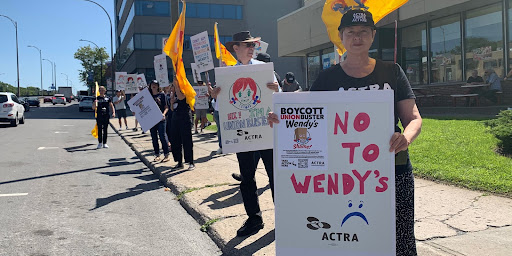“If you are going into Wendy’s I will pay for you to go to McDonald’s instead,” joked Simon Peacock, president of the Montreal branch of the Alliance of Canadian Cinema, Television and Radio Artists (ACTRA).
Peacock was joined by many other ACTRA Montreal members at a rally on August 22 outside of a Wendy’s on Decarie Blvd. The Montreal rally was part of the union’s national effort to escalate their boycott against six “union busting” brands.
Similar rallies were being held outside Wendy’s locations in Toronto and Vancouver.
ACTRA performers have been locked out by the Institute of Canadian Agencies (ICA) for more than 16 months. This means that the advertising agencies used by Wendy’s, Canadian Tire, Home Hardware, Rogers, Sleep Country and H&R block have not been using union actors in their advertising.
ACTRA says that the ICA has an agenda of opting in and out of the National Commercial Agreement (NCA), an agreement that establishes the terms and conditions for on- and off-camera performers engaged in English-language commercial production in Canada. The agreement ensures reasonable pay, benefits and retirement contributions. Allowing ICA to determine when to use union actors would ultimately weaken protections for performers, who are already precariously employed.
READ MORE: An ACTRA agreement could set high standard for gig workers
“We’ve worked from gig to gig. We’re the original gig workers, we never know when we’re going to work again. So when we do get work, it needs to be sufficiently paid so that we can last until the next gig,” Peacock said.
Peacock has been performing in Montreal since the 90’s and has witnessed the drastic changes in how performers are treated. Peacock said that actors have lost a lot of bargaining power, resulting in wages falling far behind inflation. Ultimately, if wages continue to fall, it could hurt the number of available actors in a region.
“Producers always want us available at the drop of a hat. It’s like, ‘audition tomorrow, shoot Tuesday.’ But if we need to have other jobs as well to make a living, then we’re not going to be there when they need us. So from their perspective, as well, they need to come to the table,” Peacock said.
However, in order to get the ICA back to the table, ACTRA says that they need more support on their boycott.
“We want the public to understand that brands like Wendy’s are using advertising agencies that we’ve had a relationship with for more than 60 years,” said Eleanor Noble, ACTRA National president. “But these agencies have now locked us out, they no longer want to work with union performers.”
“For a lot of performers, this is their entire livelihood. For other performers, this is the thing that they do in between film and television gigs. It’s a big part of our industry and it really helps performers earn a living across this country,” added Noble. “So having people’s livelihoods ripped out from under them overnight is just unconscionable.”
Performers are coming together against corporate greed
ACTRA’s escalating boycott against Wendy’s comes during the ongoing strike by American actors represented by the Screen Actors Guild – American Federation of Television and Radio Artists (SAG-AFTRA).
READ MORE: How technology is being used against actors and performers
Peacock said that ACTRA performers are facing many of the same challenges as SAG-AFTRA performers. Members of both unions are dealing with the same privileged few who own large swaths of the media.
SAG-AFTRA and ACTRA are held a solidarity rally in Toronto on August 25. The Writer’s Guild of America will also be included in the rally, all three unions are highlighting how creatives struggle under the greed of producers.
“ACTRA stands in solidarity with SAG-AFTRA and the WGA,” Noble said in a press release. “The issues they are fighting are our issues. Advertising Agencies, studios and streamers need to stop their corporate greed, making huge profits at the expense of our livelihoods.”
Peacock said that the coinciding strikes and boycotts are a watershed moment for creatives. Producers are finding it harder and harder to find people willing to work under their unfair contracts while union performers take to the streets.
“We’ve been looked at for a long time by producers and all sorts of media, as a way of padding out their bottom line. So they’re looking for concessions from us, when we are the smallest part of the budget,” Peacock said. “When there are similar strikes happening in the United States, then we have a lot more leverage. Suddenly, there’s less places producers can go when one jurisdiction is shut down. I think we’re getting to the point where globally, performers are starting to realize we all need to work together to fight back.”



